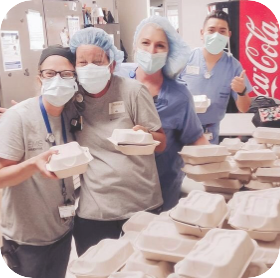
Hospital Nutrition: How Nutritious is it?
Posted March 29, 2023
We go to the hospital to to receive care for an illness or injury. After a surgery or your doctor prescribing medication what happens next? Mom always told us to eat our fruits and vegetables to grow big and strong, so why when our body is recovering is the hospital feeding us fatty, salty, ultra processed foods?
We are all TOLD and know that a healthy diet prevents disease and assists healing but where do people begin after a sudden heart attack or as a newly diagnosed diabetic? Starting a new healthy food plan is viewed by many as intimidating, daunting and expensive, when in reality eating healthy foods is as easy as reaching for that bag of chips. We need to teach old and new dogs new tricks so they can have a better understanding of what food does and how it benefits the body and mind. Shouldn't this first step in education be taught at hospitals from professionals that “know their stuff”? The food patients are being served is actually worsening their health.
As a whole we must address the issue that what we are eating and chronic illness are closely related. When analyzing hospital diets for example: cardiac and diabetic diets, it is SHOCKING to see they are nowhere near what should be recommended. Because of this, that patient will return again, probably with worsened symptoms in just a few short months because they were not taught the preventive solutions (nutrition) that landed them into the hospital bed in the first place. Here comes readmittance, which then costs the patient, the insurance company and the hospital system valuable time and resources.
Developing nutritious hospital menus can be easy. Hospitals are pinned with the responsibility of high volumes of food at a low cost and oftentimes this means utilizing pre-packaged and overly-processed foods with minimal nutritional value. But there is a way to accomplish this feat while also feeding people food that fuel their healing and overall health. By changing suppliers, breaking corporate contracts we can put simple wholesome ingredients into the foods served. It shouldn't be impossible to diagnose the ROOT of an illness and achieve and maintain a healthy lifestyle.
Instead of investing millions into treatments and band-aids (pharmaceuticals), hospitals should consider investing in wholesome, nutritious foods for patients and staff alike. Let’s end the corporate greed and contracts with the Taco Bells, Pizza Huts, Subways and Ben and Jerry’s in the hospital cafeterias. Our frontline heroes and patients need nutritious wholesome food, not the less expensive saturated garbage that feeds the hospital system. A healthy meal is the start of a healthy mind, body and soul.
Recent Posts

Top 100 Entrepreneur Awards at Belmont University
Posted December 20, 2023
The 5th annual Belmont University Entrepreneur Awards took place on December 11, 2023. This evening recognizes Belmont University alumni who have started innovative and unique businesses. The awards honor the founders who are excelling in business and challenging their industries.

A Healthy Spin on Dinner Parties
Posted August 15, 2023
A nursing school dropout, Placemat Founder, Ryan Reisdorf's passion lies in health. He was diagnosed with Type 1 diabetes at an early age, and he has had a vested interest in wellness ever since.

Belmont Nursing Student turned Entrepreneur
Posted May 24, 2023
What If… Food Could Transform Our Community’s Health? Ryan Reisdorf founder of Placemat studied nursing at Belmont while launching his business with the mission of nourishing communities through feel-good food experiences. Placemat provides healthful, locally sourced food through 5 distribution channels. Over the past 5 years, Placemat has grown into a multi-million dollar business and has donated over 150K meals to people in need. On What if.. A Belmont Entrepreneur Podcast, we talk about staying true to your “why”, how Ryan’s nursing education prepared him for life as an entrepreneur, and of course…food!
The Light Bulb Moment
Posted September 2, 2023
“Hey, is Placemat available on Friday for dinner for 14?”